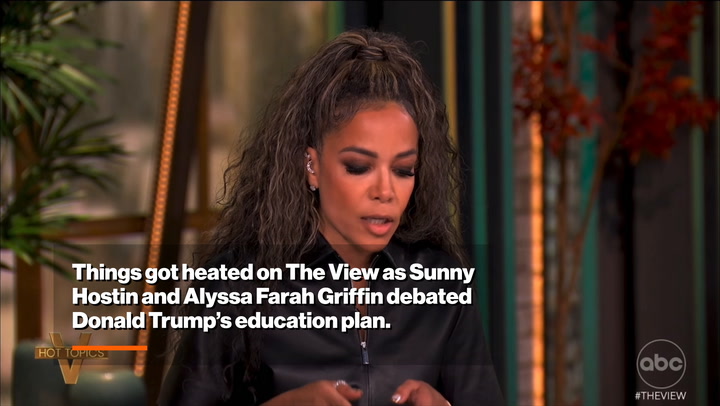Sunny Hostin Makes Dig At Childless Alyssa Farah Griffin In Heated Debate About School Choice: “Because I Have Children”

In an intense episode of “The View,” a lively debate erupted between co-hosts Sunny Hostin and Alyssa Farah Griffin, focusing on the contentious topic of school choice and the voucher system. This system allows parents the freedom to select educational institutions beyond their assigned districts, sparking varying opinions from the panelists. Hostin, who shared heartfelt insights from her upbringing in the South Bronx, voiced her strong concerns regarding the distribution of funds within the education system, particularly the $18.4 billion allocated by the Department of Education, which she argued primarily supports high-poverty K-12 schools.

During the debate, Hostin expressed alarm over the fact that voucher programs are frequently utilized by wealthier families, a move she believes detracts vital funding from under-resourced schools that desperately need it. She pointed to research indicating that many states running these programs do not mandate teachers to possess degrees or licensing, raising serious questions about the quality of education available to students who use these vouchers for schooling. For Hostin, these issues are deeply personal, stemming from her own experiences as a parent with a vested interest in the educational landscape.
The Impact of Vouchers on Education Quality

As the debate unfolded, Griffin attempted to interject with her perspective, citing her own experiences in public schools. In a heated moment, Hostin, leveraging her status as a parent, underscored that her opinions were shaped by the realities of raising children and making critical educational choices for them. This dynamic escalated into an impassioned exchange, illustrating the different lenses through which each co-host views the education debate.

Griffin passionately argued that her public school education was vital to her development, countering Hostin’s perspective that the voucher system might compromise educational quality. The debate hinted at deeper ideological divides surrounding educational policies and their broader implications, particularly regarding equity and access for families across socioeconomic strata.
Role of Personal Experience in Education Debates

The intersection of personal narratives and policy discussions is an essential theme highlighted during the debate. Hostin’s own experiences as a mother informed her critical stance on issues affecting the education of future generations. This insight shaped her commentary, as she articulated her concerns over a system that she feels disproportionately favors affluent families at the expense of those in lower-income brackets. Griffin, countering with her background in public education, encouraged a more balanced view, emphasizing the potential benefits of school choice for families seeking alternatives to underperforming local schools.
As the moderator, Whoopi Goldberg intervened in the heated discussion, attempting to steer the conversation back to a more civil tone as the co-hosts expressed their frustrations with one another. Goldberg’s efforts underscored the challenge of maintaining decorum in debates fueled by strong emotions and deeply held beliefs. Griffin’s frustrations were palpable as she attempted to highlight her own perspectives within the multifaceted dialogue.
Reflections on School Choice and Growing Tensions

This debate is emblematic of the ongoing tensions and passionate discussions surrounding educational policies in the contemporary landscape. “The View,” with its commitment to addressing significant societal issues, continues to showcase the differing viewpoints among its panelists. The heated exchange between Hostin and Griffin reflects not only a personal clash of ideologies regarding school choice but also a broader societal debate on how to ensure equitable access to quality education for all children.
As discussions continue to unfold on “The View,” audiences are left contemplating the complexities of school choice policies and their repercussions for families across the nation. The divide illustrated by Hostin and Griffin’s exchange serves as a reminder of the numerous aspects to consider in the ongoing discourse about education reform and the future of schooling in America.
Conclusion

As parents, educators, and policymakers grapple with the nuances of school choice and its implications, it is clear that open dialogues like those on “The View” play a crucial role in informing public opinion. If you want to keep abreast of these critical conversations around education and policy, tune in to “The View” for insights and varied perspectives that matter. Let’s engage in constructive discussions to shape a better future for our children.





